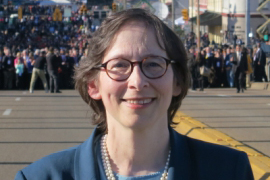“Looking to the Supreme Court to ensure the right to vote in this election is probably whistling past the graveyard,” said Stanford Law Professor Pamela Karlan during a BC Law American Constitution Society event on October 6.
Karlan, who argued the landmark civil rights case Bostock v. Clayton County at the Supreme Court and testified in the Trump impeachment hearings last year, has also published extensively on democracy and election law. At BC Law, she talked about the challenges to full political participation and proper ballot counting, difficulties exacerbated this year by Covid-19. The pandemic has helped to illuminate many voting problems that already existed.
In addition to Covid-19-related difficulties such as voter reluctance to go to the polls and a shortage of poll workers, Karlan pointed to a broader complication: that the presidential election is not a national election; it is a local election because every state has different rules.
Karlan explained that there are half a dozen states where every voter receives a ballot in the mail, while on the other end of the spectrum, in Texas, for example, the Supreme Court has said susceptibility to Covid-19 does not qualify people to vote by mail. Other states have restrictions on how people can vote by mail—in South Carolina, for one, a witness signature is required. Further, it takes longer to count a ballot that’s been mailed and there is a higher rate of ballot spoilage in absentee voting. If you vote in person and the ballot is spoiled, you can fill out another ballot, while in some states you won’t even be told that your mail-in ballot was spoiled.
Karlan also spoke about what might happen after election day. It could be close to three weeks until results can be called, as happened in some California jurisdictions during this year’s primary election. She also warned of the red mirage and the blue wave; as votes are counted and preliminary tallies are released, a disproportionate number of the voters are going to be Republicans. Compared to Democrats, Republicans plan to vote in person on election day at much higher rates, and Republicans who vote by mail also tend to return ballots earlier, Karlan observed. She predicted that this red mirage will be followed by the blue wave, as Democratic ballots come in. Such was the trend in 2018, for example, in the Arizona senate race.
The trend explains why Republican consultants want to stop counting ballots early, including vote by mail and absentee ballots, Karlan said. There is a lot of litigation currently over competing positions on whether every vote should be counted. This litigation process and recount process can go on for a very long time. The recount in the November 2008 United States Senate election in Minnesota was not finished until the following May, for example.
In the presidential election, however, time is of the essence, Karlan emphasized. If, as the 22nd Amendment requires, there is no new president by noon on January 20, the Presidential Succession Act (which has never yet been invoked) would kick in. Furthermore, if the states that have safe harbor provisions have decided on their electors by December 8, those electors could not be challenged later on.
Returning to the Supreme Court’s role in all this, Karlan looked at the possible confirmation of Judge Amy Coney Barrett to the Supreme Court and its implications for future decisions on voting. To describe the current predicament Democrats face, Karlan quoted from Robert Bolt’s A Man for All Seasons: “If you chop down all the laws that protect us, when you turn around and face the devil, you face the devil on your own.”


